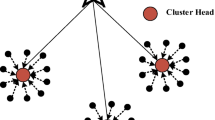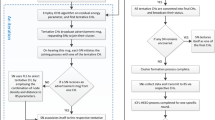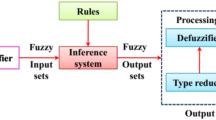Abstract
Energy efficiency is a significant problem in wireless sensor networks. Sensor networks are battery powered, therefore become a dead after certain period of time. In clustering technique, the cluster head selection is an essential issue. To moderate all above problems, this paper introduced adaptive fuzzy rule based energy efficient clustering and immune-inspired routing (FEEC-IIR) protocol for WSN assisted IoT system. For an optimal cluster head selection, adaptive fuzzy multi-criteria decision making approach (AF-MCDM) is used which is a combination of fuzzy AHP and TOPSIS method is introduced an energy efficient clustering algorithm. The criteria of energy status, QoS impact and node location are taken as the main factors that can influence the selection of cluster heads while each criteria contains some sub-criteria. For routing, immune-inspired optimization algorithm is used to enhance the data delivery reliability. The cluster based routing is an efficient manner to reduce the energy consumption. The experimental results show that our introduced approach improves the QoS parameters such as packet delivery ratio, packet loss ratio, throughput, network lifetime, end to end delay, channel load, jitter, bit error rate (BER), buffer occupancy and energy consumption compared with existing clustering and routing approach.













Similar content being viewed by others
References
Aadri A, Idrissi N (2017) An energy efficient hierarchical routing scheme for wireless sensor networks. In: Computer science & information technology, pp 137–148
Ai Z-Y, Zhou Y-T, Song F (2018) A smart collaborative routing protocol for reliable data diffusion in IoT scenarios. Sensors 18:1926
AlSkaif T, Bellalta B, Zapata MG, José M, Barceló, Ordinas (2017) Energy efficiency of MAC protocols in low data rate wireless multimedia sensor networks: a comparative study. Ad Hoc Netw 56:141–157
Elappila M, Chinara S, Parhi DR (2018) Survivable path routing in WSN for IoT applications. Pervasive Mob Comput 43:49–63
Farman H, Jan B, Javed H, Ahmad N, Iqbal J, Arshad M, Ali S (2018) Multi-criteria based zone head selection in internet of things based wireless sensor networks. Future Gener Comp Syst 87:364–371
Fouladlou M, Khademzadeh A (2017) An energy efficient clustering algorithm for wireless sensor devices in internet of things. IEEE 5:39–44
Gupta V, Singhla A, Rajan P, Taneja H (2018) Improving efficiency of wireless sensor network using LEACH protocols. Int J Sci Res Comput Sci Eng Inf Technol 3:672–676
Han G, Zhou L, Wang H, Zhang W, Chan S (2018) A source location protection protocol based on dynamic routing in WSNs for the social internet of things. Future Gener Comp Syst 82:689–697
Hong Z, Pan X, Chen P, Su X, Wang N, Lu W (2018) A topology control with energy balance in underwater wireless sensor networks for IoT-based application. Sensors 18:2306
Hosen ASM, Cho GH (2018) An energy centric cluster-based routing protocol for wireless sensor networks. Sensors 18:1520
Khalil N, Abid MR, Benhaddou D, Gerndt M (2014) Wireless sensors networks for Internet of Things. In: IEEE ninth international conference on Intelligent sensors, sensor networks and information processing (ISSNIP), IEEE, pp. 1–6
Khan F, Alam A, Ahmad, Imran M (2018) Energy optimization of PR-LEACH routing scheme using distance awareness in internet of things networks. Int J Parallel Progr 56:1–20
Kuo Y-W, Li C-L, Jhang J-H, Lin S (2018) Design of a wireless sensor network-based IoT platform for wide area and heterogeneous applications. IEEE Sens J 18(12):5187–5197
Li H, Savkin AV (2018) Wireless sensor network based navigation of micro flying robots in the industrial internet of things. IEEE Trans Industr Inf 14:3524–3533
Mahajan S, Dhiman PK (2016) Clustering in WSN: a review. Int J Adv Res Comput Sci 7(3):198–201
Moh’d Alia O (2018) A dynamic harmony search-based fuzzy clustering protocol for energy-efficient wireless sensor networks. Ann Telecommun 73:353–365
Mostafa B, Benslimane A, Saleh M, Kassem S, Molnar M (2018) An energy-efficient multi-objective scheduling model for monitoring in internet of things. IEEE Int Thing J 5:1727–1738
Naranjo PG, Vinueza M, Shojafar H, Mostafaei Z, Pooranian, Baccarelli E (2017) P-SEP: a prolong stable election routing algorithm for energy-limited heterogeneous fog-supported wireless sensor networks. J Supercomput 73(2):733–755
Park JH, Yen NY, J (2018) Advanced algorithms and applications based on IoT for the smart devices. Ambient Intell Human Comput 9:1085. https://doi.org/10.1007/s12652-018-0715-5
Ramachandran N, Perumal V (2018) Delay-aware heterogeneous cluster-based data acquisition in internet of things. Comput Electr Eng 65:44–58
Shakeel PM, Baskar S, Dhulipala VRS et al (2018) Cloud based framework for diagnosis of diabetes mellitus using K-means clustering. Health Inf Sci Syst 6:16. https://doi.org/10.1007/s13755-018-0054-0
Shen J, Wang A, Wang C, Patrick CK, Hung, Chin-Feng L (2017) An efficient centroid-based routing protocol for energy management in WSN-assisted IoT. IEEE Access 5:18469–18479
Sheng Z, Tian D, Victor CM, Leung (2018) Toward an energy and resource efficient internet of things: a design principle combining computation, communications, and protocols. IEEE Commun Mag 56(7):89–95
Singh M, Kumar N (2018) Energy efficient routing protocol in IoT. JNCET 8:5
Sridhar KP, Baskar S, Shakeel PM et al (2018) Developing brain abnormality recognize system using multi-objective pattern producing neural network. J Ambient Intell Human Comput. https://doi.org/10.1007/s12652-018-1058-y
Wang Y, Chen H, Wu X, Shu L (2016) An energy-efficient SDN based sleep scheduling algorithm for WSNs. J Netw Computer Appl 59:39–45
Xu Z, Chen L, Chen C, Guan X (2016) Joint clustering and routing design for reliable and efficient data collection in large-scale wireless sensor networks. IEEE Int Things J 3(4):520–532
Zeng B, Dong Y, Li X, Gao L (2017) IHSCR: energy-efficient clustering and routing for wireless sensor networks based on harmony search algorithm. Int J Distrib Sens Netw 13:11
Author information
Authors and Affiliations
Corresponding author
Additional information
Publisher’s Note
Springer Nature remains neutral with regard to jurisdictional claims in published maps and institutional affiliations.
Rights and permissions
About this article
Cite this article
Preeth, S.K.S.L., Dhanalakshmi, R., Kumar, R. et al. An adaptive fuzzy rule based energy efficient clustering and immune-inspired routing protocol for WSN-assisted IoT system. J Ambient Intell Human Comput (2018). https://doi.org/10.1007/s12652-018-1154-z
Received:
Accepted:
Published:
DOI: https://doi.org/10.1007/s12652-018-1154-z




